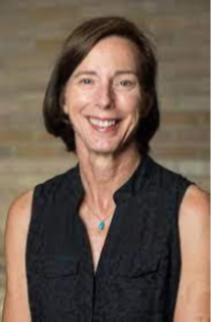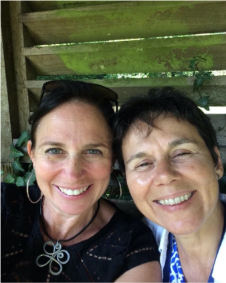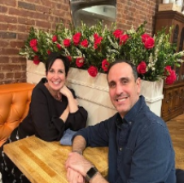Amanda Berry in 3-D
Introduction
By Julian Kitchen
Amanda Berry has been active in the S-STEP community since her doctoral research under the guidance of John Loughran. An interest in teacher development led Mandi to shift from being a biology teacher to studying teacher preparation and her own practice as a teacher educator. Her doctoral study led to the highly cited “Reconceptualizing Teacher Educator Knowledge as Tensions” in Studying Teacher Education, 3(2) and to her book, Tensions in Teaching about Teaching. Mandi’s work on tensions resonated for many, including Eline Vanassche (below) and me. Mandi also contributed significant chapters to both the 2004 and 2020 editions of the International Handbook of Self-Study of Teaching and Teacher Education Practices. While Mandi’s academic accomplishments are considerable, it is her commitment to others that make her a deeply loved member of our S-STEP community. It has been my honour to work alongside Mandi as co-editors of Studying Teacher Education and on the editorial team for the second edition of the handbook, so I concur with the accounts of her generous and collaborative nature by three colleagues below.

1st Dimension: Teacher Education
by John Loughran, Monash University
As an outstanding high school biology teacher, Mandi made the transition to teacher education driven by her desire to support teachers' professional development and to push education faculties to recognize and better value the role of teaching teachers. I had the pleasure to teach with her for over a decade and so witnessed first-hand her commitment, passion and thoughtful approach to teaching and learning about teaching. As a teacher educator, her efforts always centered on students' learning. Her planning and preparation were characterised by a deep consideration of her ever-growing pedagogy of teacher education; which she researched and developed in ways that illustrated to all the importance of learning through self-study. Her practice was personified by modelling practice in a careful, honest and incredibly professional manner. It is hardly surprising that someone who was so highly regarded as a colleague, collaborator, mentor and leader became such a consistent and purposeful contributor to her students’ learning about teaching and to the self-study community more broadly. Through all that she did, she made clear what it meant to be a teacher educator of distinction.
2nd Dimension: Scholarship
by Eline Vanassche, University of Leuven
I met Mandi Berry in 2010 at the registration desk of the Castle Conference. While customizing my conference badge with stickers, I felt myself pulled in different directions by competing concerns about my first appearance at the conference. Mandi engaged in explicit modelling: she articulated her own doubts while adding the boldest of stickers to her badge. This memory metaphorically captures her contribution to my thinking and the field at large. In an influential book and in articles, Mandi helped by building a language for teacher education practice through tensions. The tensions between telling and growth, planning and being responsive, or safety and challenge capture the internal conflict highly recognizable to many of us when educating teachers. Tensions help to question the taken-for-granted. They do not tell us what to do. Tensions capture and hold onto ambivalence, rather than reducing or solving it. In so doing, Mandi’s self-study scholarship has offered a powerful contrast
3rd Dimension: Community
by Mieke Lunenberg, VU University Amsterdam
Mandi is a core member and former chair of S-STEP. She is also a longtime editor of Studying Teacher Education. Mandi is caring, open to new ideas and an excellent scholar. At AERA- and Castle Conferences she brings people with related interests together. Worth knowing is also that she likes working dinners. After staying a few months in an apartment in Amsterdam earlier, Mandi returned to the Netherlands in 2012 and lived there for three years. During that period of time, she was frequently invited to contribute to meetings and conferences in Europe, something she did with enthusiasm, involvement and expertise. Personally, I look back with a big smile to our co-coaching of a Dutch self-study group that had as motto ‘Saying yes to the adventure’. A motto that fits Mandi. Her work in Europe has strengthened professional connections and friendships across oceans.
The Last Word
by Amanda Berry, Monash University
It has been my absolute privilege and honor to have ‘grown up’ amongst the international self-study community of scholars. From my earliest encounters, where I tentatively shared my doctoral study ideas about teacher educators’ knowledge as ‘tensions of practice’ at the graduate student seminar at AERA, through to my current ‘senior’ roles as co-editor of Studying Teacher Education and contributor to the two international handbooks of self-study, I have been supported, encouraged, befriended and challenged as a teacher educator who learns from the study of my own and others’ practice. Teaching and researching one’s own educational practice is an endeavour that requires personal courage and commitment as well as the support and care of others. The self-study community embodies this ethic of care at the same time that we aim to produce rigorous research that builds greater understanding, respect and value for teacher educators’ professional work and status. Teaching and researching with John Loughran, developing a Dutch community of self-study scholars with Mieke Lunenberg and Janneke Geursen, researching and writing with Eline Vanassche, and co-editing Studying Teacher Education with Julian Kitchen are absolute highlights of my academic life. Finally, given the ways in which teacher educators’ work and learning continues to be undervalued, over-regulated and misunderstood in many countries, there is still much work for our self-study community. I look forward to continuing my contribution to this effort.
Monica Taylor in 3-D
Introduction
by Julian Kitchen, Brock University
 Monica Taylor is a feminist teacher educator with a deep commitment to social justice. Monica first gained prominence in self-study through her co/autoethnographic feminist work with Lesley Coia. They embodied teacher educators living relationally with others: students, peers and minoritized communities. Monica’s personal commitment to social justice is demonstrated in stories of her sons in Exploring Gender and LGBTQ Issues in K-12 and Teacher Education (edited by Martin and Strom). Her professional commitment is evident in edited volumes, notably Gender Feminism and Queer Theory in the Self-Study of Teacher Education Practices with Lesley and the social justice section she edited for the International Handbook of Self-Study of Teaching and Teacher Education Practices, Second Edition. Feminism serves as both a critical lens and an ethical orientation for Monica and her colleague Emily Klein in Our Bodies Tell the Story. While acknowledging that social justice work taxes our hearts, minds, and bodies, they draw on their stories to demonstrate how we might enact feminism and social justice living reflectively and authentically alongside others.
Monica Taylor is a feminist teacher educator with a deep commitment to social justice. Monica first gained prominence in self-study through her co/autoethnographic feminist work with Lesley Coia. They embodied teacher educators living relationally with others: students, peers and minoritized communities. Monica’s personal commitment to social justice is demonstrated in stories of her sons in Exploring Gender and LGBTQ Issues in K-12 and Teacher Education (edited by Martin and Strom). Her professional commitment is evident in edited volumes, notably Gender Feminism and Queer Theory in the Self-Study of Teacher Education Practices with Lesley and the social justice section she edited for the International Handbook of Self-Study of Teaching and Teacher Education Practices, Second Edition. Feminism serves as both a critical lens and an ethical orientation for Monica and her colleague Emily Klein in Our Bodies Tell the Story. While acknowledging that social justice work taxes our hearts, minds, and bodies, they draw on their stories to demonstrate how we might enact feminism and social justice living reflectively and authentically alongside others.
1st Dimension: Teacher Education
by Stefinee Pinnegar, Brigham Young University
At AERA this year, I went to a roundtable session (all of the presentations were quantitative). The first presenter was a woman from Montclair State. After the session, I paused to mentioned I knew Monica Taylor; she immediately began praising Monica’s teaching. While she was not Monica’s student, she recalled classes taken, support given and the propound learning experiences she had with Monica. None of this was news to me or to any of those of us in the S-STTEP community for that has always been our experiences with Monica. She has taught us about feminism and autoethnography and how to be a good community member. I have had important learning experiences with her and ever felt her care and support. Just as importantly to the community are the strong revitalizing scholars she has mentored and added to our community: the editor of this newsletter (Adrian Martin being only one of many). I said to the young woman I met, how delightful it was to meet a student of Monica’s since I felt I was one as well. There in the sterile environment of AERA in true SIGly fashion (as named by Mary Manke), we hugged having made another wonderful connection through Monica.
2nd Dimension: Scholarship
by Kathleen Pithouse-Morgan, University of Nottingham
Monica Taylor's seminal work in co/autoethnography, feminist and queer pedagogy, embodied pedagogy, and gender and sexuality in teacher education has profoundly impacted self-study scholarship. Her persistent efforts have resulted in new concepts and approaches to self-study research promoting equity and social justice. As a forthright opponent of sexism, heteronormativity, and racism, her research boldly demonstrates how self-study, motivated by social justice and equity goals, can lead to groundbreaking discoveries and novel approaches to improving educational practice. She has inspired and mentored a network of self-study scholars that deliberately and consistently address social justice concerns, pushing the boundaries of personal and professional transformation. Monica Taylor’s enduring legacy stimulates and shapes the landscape of self-study research, forging a path towards a more inclusive and just educational system.
3rd Dimension: Community
by Adrian D. Martin, New Jersey City University
Monica Taylor exemplifies the qualities of an activist feminist scholar. She is committed to enacting her values not only within the S-STEP community and the broader academic community, but in her life as well. As a faculty member, Monica’s classes foster a sense of belonging and inclusion as students grapple with critical issues and topics in education. As one of the editors of the 2nd edition of the International Handbook of Self-Study of  Teaching and Teacher Education Practices, Monica provided her expertise and guidance to contributing authors. In her current role as S-STEP SIG Chair-Elect, Monica’s leadership reflects a vested interest in continuing to support our community as a diverse, dynamic, and inclusive international network of teacher educators. Monica’s dedication to community and inviting new scholars to S-STEP is certain to enhance our SIG and by extension support the future workforce of educators capable of navigating the challenges of our times.
Teaching and Teacher Education Practices, Monica provided her expertise and guidance to contributing authors. In her current role as S-STEP SIG Chair-Elect, Monica’s leadership reflects a vested interest in continuing to support our community as a diverse, dynamic, and inclusive international network of teacher educators. Monica’s dedication to community and inviting new scholars to S-STEP is certain to enhance our SIG and by extension support the future workforce of educators capable of navigating the challenges of our times.
The Last Word
by Monica Taylor, Montclair State University
I am humbled and so moved by the touching words written above by my dear colleagues, Julian, Stefinee, Kathleen, and Adrian, as their perspectives as mentors, peers, collaborators, and, even, a former student, remind me of the range of my experiences within my cherished self-study community. About ten years ago, Lesley Coia and I wrote an introduction for our edited book on self-study and gender, feminism, and queer theory. We described how discovering self-study, or it discovering us through Jeff Kaplan, was really like finding our home where we could be our authentic and true self and have the space and support to explore our work creatively and take risks. Over the last 21 years that is exactly what I have been doing because I have felt seen, heard, and respected by people like John Loughran, Anastasia Samaras, Clare Kosnik, Clive Beck, Stefinee Pinnegar and Mary Lynn Hamilton, Mary Dalmau, Lynn Thomas, and so many more. I have often said to peers and students that I have received more scholarly mentoring and love through the self-study community than any other organization or institution including my own. I found my academic voice in this community and I only hope that I can continue to always pay that forward and ensure that the self-study community is welcoming, inclusive, and supportive of all scholars but in particular those who are new to the field.